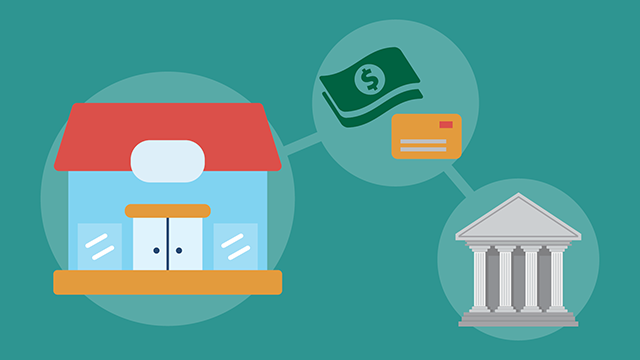Exploring simple uses of Cash Advance Payday Loans for immediate needs
A Comprehensive Overview to Home Loans: Services and Options Explained
Charting the world of home mortgage can be complex. Numerous alternatives exist, each with distinct features and ramifications for prospective home owners. Understanding the differences between government-backed and conventional lendings is necessary. The application procedure involves precise documentation and pre-approval steps that numerous ignore. As debtors commence on their home-buying trip, understanding exactly how to take care of these responsibilities successfully could suggest the distinction in between economic stability and difficulty. What strategies can empower them on this course?
Recognizing Home Loans: Types and Terms
Comprehending the various kinds of home loans and their associated terms is essential for prospective property owners, as it furnishes them with the understanding needed to make educated economic choices. Home mortgage can be generally categorized right into fixed-rate and adjustable-rate home loans. Fixed-rate home loans preserve a constant rate of interest rate over the life of the funding, offering security in regular monthly payments. Installment Loans. Conversely, variable-rate mortgages include rate of interest that may change after a first set period, possibly leading to lower preliminary payments but raised future prices
Added terms is necessary for clearness. Principal refers to the lending quantity obtained, while passion is the expense of borrowing that quantity. The term of the car loan suggests its period, commonly varying from 15 to thirty years. Understanding these essential concepts allows potential purchasers to navigate the complicated landscape of home financing, guaranteeing they select the appropriate finance choice that lines up with their monetary circumstance and lasting objectives.
Traditional Loans vs. Government-Backed Loans
A significant difference in home financing exists in between standard finances and government-backed financings, each providing to different debtor needs and scenarios. Standard loans are not guaranteed or assured by the government and typically call for higher credit rating and down payments. They are often appealing to borrowers with secure economic histories, as they may use affordable rates of interest and terms.
On the other hand, government-backed finances, such as FHA, VA, and USDA car loans, are designed to help particular groups of customers, including first-time homebuyers and veterans. Fast Cash. These car loans generally feature reduced down payment requirements and more adaptable credit scores standards, making them obtainable to a broader series of people
Ultimately, the choice in between government-backed and conventional finances pivots on the borrower's economic scenario, long-term goals, and eligibility, making it necessary to thoroughly evaluate both alternatives prior to making a choice.

The Duty of Rate Of Interest in Home Financing
Rate of interest prices play an essential role in home funding, affecting consumers' decisions between set and variable price car loans. The option between these alternatives can considerably influence regular monthly payments, influencing general affordability. Recognizing how interest rates operate is important for anyone steering via the home financing process.
Fixed vs. Variable Rates
Homebuyers deal with an essential choice when picking in between fixed and variable rates, as this selection considerably affects the expense of funding gradually. Fixed-rate home mortgages provide security, securing in a rate of interest for the life of the financing, which can be helpful in a climbing rate of interest setting. This predictability allows property owners to budget plan better. Conversely, variable-rate home loans, or variable-rate mortgages (ARMs), generally begin with reduced initial prices that can fluctuate based upon market conditions. While this might bring about lower initial repayments, borrowers encounter the threat of raised prices in the future. Inevitably, the selection in between set and variable prices depends on individual financial circumstances, danger tolerance, and expectations concerning future rate of interest price trends.
Influence on Regular Monthly Repayments
When evaluating home financing options, the influence of rate of interest rates on regular monthly settlements is a key factor to ponder. Rates of interest directly affect the overall cost of borrowing, impacting just how much a customer will certainly pay every month. A reduced interest rate results in smaller sized monthly settlements, making homeownership a lot more economical. Alternatively, greater rates can significantly boost regular monthly responsibilities, potentially straining a homeowner's spending plan. Additionally, the funding term plays an important role; longer terms may spread out repayments out yet can lead to paying even more interest in time. Understanding exactly how rates of interest connect with finance quantities and terms is vital for consumers to make informed economic choices and select a home loan that aligns with their long-term monetary goals.
Mortgage Brokers vs. Straight Lenders: Which Is Right for You?
When taking into consideration a mortgage, possible customers must understand the unique duties and responsibilities of home loan brokers and direct lending institutions. Each alternative presents its own benefits and downsides, which can significantly influence the overall cost of funding. An enlightened option calls for careful analysis of these factors to establish the finest suitable for specific requirements.
Duties and Duties Defined
Navigating the complexities of home funding calls for a clear understanding of the functions and obligations of mortgage brokers and direct lending institutions. Home mortgage brokers serve as intermediaries, linking borrowers with lending institutions. They assess a borrower's financial circumstance, curate loan alternatives, and overview clients with the application procedure, frequently leveraging numerous lender partnerships to secure beneficial terms. Conversely, direct lenders, such as financial institutions and lending institution, provide loans straight to borrowers. They deal with the whole car loan procedure, review from application to funding, with a concentrate on their very own items. Each choice offers unique methods for obtaining funding, making it crucial for customers to assess their choices and needs when determining in between involving a mortgage broker or collaborating with a direct lender.
Advantages and disadvantages Comparison
Selecting between a home mortgage broker and a straight lending institution can substantially impact the home funding experience, as each option uses unique benefits and drawbacks. Mortgage brokers work as middlemans, offering accessibility to multiple loan providers and potentially far better prices, while streamlining the lending process. They may bill fees and rely on payment structures that can affect their recommendations. On the various other hand, straight loan providers simplify the process by supplying in-house finances, which can bring about quicker approvals and less difficulties. Alternatively, they may have a limited option of products and less flexibility relating to rates. Eventually, the choice hinges on specific preferences, financial situations, and the preferred level of assistance throughout the mortgage journey.
Price Effects Evaluated
While reviewing the additional reading cost effects of home loan brokers versus direct lending institutions, potential homeowners need to take into consideration numerous elements that can considerably affect their general costs. Home loan brokers usually bill costs for their solutions, which can differ significantly, influencing the overall lending price. They typically have access to a bigger range of lending products and competitive rates, potentially conserving debtors cash in the lengthy run. Alternatively, straight lending institutions may use a more straightforward process with possibly reduced upfront costs, yet their lending alternatives may be restricted. It is essential for property owners to compare rate of interest, fees, and terms from both lenders and brokers, guaranteeing they make an informed choice that lines up with their monetary objectives and requirements.
The Mortgage Application Process: What to Anticipate

The home funding application procedure can commonly feel daunting for numerous candidates. It commonly begins with gathering needed documents, including evidence of revenue, credit report background, and personal identification. Lenders utilize this information to analyze the applicant's financial stability and establish car loan eligibility.
Next off, applicants submit a formal application, which might entail loading out online kinds or supplying details in individual. Throughout this stage, lending institutions assess different elements, such as debt-to-income proportion and credit report, to pick lending terms.
When pre-approved, the lending institution will certainly perform a detailed assessment of the property to determine its value straightens with the lending quantity. This stage might likewise consist of added background checks.

After final authorizations and problems are met, the funding is refined, leading to the closing phase. Understanding each step equips candidates, making the journey smoother and much more workable as they approach homeownership.
Tips for Handling Your Home Funding Sensibly
Effectively navigating the mortgage application procedure is simply the beginning of a responsible financial journey. Managing a home finance calls for interest to several crucial practices. Debtors ought to develop a clear spending plan that suits month-to-month home loan settlements, building taxes, and insurance coverage. Regularly evaluating this spending plan aids avoid overspending and assurances timely settlements.
Furthermore, making extra payments when possible can substantially decrease the finance principal and overall interest paid with time. Consumers should also keep open lines of communication with their lender, especially in times of financial problem. This can result in prospective options such as finance adjustments or re-financing alternatives.
Finally, it is a good idea to check credit report routinely. A great credit report can give possibilities for better loan terms in the future. Payday Loans. By adhering to these ideas, homeowners can browse their lending obligations effectively, assuring long-term economic wellness and stability
Often Asked Inquiries
What Are Closing Costs and Just How Are They Calculated?
Closing prices include costs connected with wrapping up a home loan, including assessment, title insurance policy, and funding origination charges. These prices usually vary from 2% to 5% of the loan amount, varying based upon location and loan you could check here provider.
Can I Receive a Mortgage With Bad Credit Score?
Yes, people with bad debt can receive a home financing, though alternatives might be restricted. Lenders often require higher down payments or rates of interest, and checking out government-backed finances might improve opportunities of authorization.
What Is Home mortgage Insurance policy and When Is It Needed?
When a customer makes a down settlement of less than 20%, home loan insurance coverage protects lending institutions against default and is typically needed. It ensures that lending institutions recover losses if the consumer stops working to settle the funding.
Just How Does Refinancing Work and When Should I Consider It?
Refinancing involves replacing a current home mortgage with a new one, normally to safeguard a reduced rates of interest or change funding terms. House owners should take into consideration re-financing when interest prices drop significantly or their monetary situation improves.
What Happens if I Miss a Home Mortgage Payment?
If a home mortgage settlement is missed, the loan provider normally assesses late costs, reports the delinquency to credit bureaus, and may start repossession proceedings if settlements proceed to be disregarded, at some point endangering the homeowner's residential or commercial property.
Fixed-rate home loans preserve a consistent rate of interest rate over the life of the car loan, giving stability in month-to-month payments. A substantial difference in home financing exists between government-backed lendings and traditional financings, each providing to various consumer requirements and conditions. In contrast, government-backed fundings, such as FHA, VA, and USDA lendings, are designed to aid specific groups of consumers, including novice homebuyers and veterans. Interest prices play an essential function in home funding, influencing consumers' decisions between set and variable rate finances. Fixed-rate home mortgages use stability, locking in an interest rate for the life of the financing, which can be helpful in a climbing rate of interest rate atmosphere.